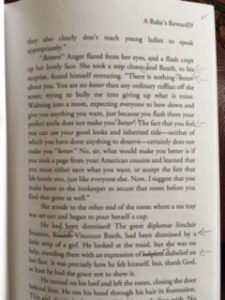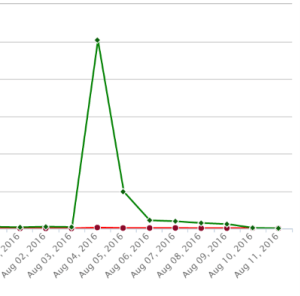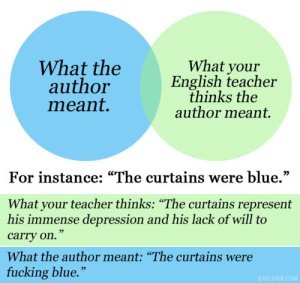Meredith Bond's Blog
September 24, 2016
So nervous!
Why is it that even after writing and publishing fifteen books, I still get nervous butterflies in my stomach when someone tells me that they’re reading one of my books?
Will they like it? Will they connect with the characters? Will they close the book after a few chapters and not have the desire to pick it up again? Or, as with my more recent worries, will they find hundreds of errors in the grammar and punctuation?
Yikes!
You’d think I’d have some confidence in my writing by this point. But do I?
Eh… not really.
Oh, that’s not to say that I think that I don’t know what I’m doing when I sit down to write. I most certainly do. I’ve studied writing out the wazoo. I know exactly how to do it. I’ve got my worksheets and graphs of my characters, their developmental arcs, the romantic arc… all that. And I know exactly how to write. How to let the characters speak through me. I really get into the scenes I write and write them with authenticity.
And some people have said how wonderful my writing is—people I trust and admire. But others have said how awful it is. How they just couldn’t like a character, or found them flat. Plenty of people have said that they didn’t like the story—and I’m totally find with that. Not every story will be enjoyed by everyone who picks it up to read it.
 My favorite comment in a review was where the writer questioned my mental balance—honestly! She thought I needed psychiatric help for thinking up the book that I’d written (it was Air: Merlin’s Chalice, in case you’re wondering). She might be right. I might need mental help, not for my creativity or lack there-of, but for my insecurity, perhaps my panic and worry about how people will react to my work (and there’s the touch of depression, but that’s a whole other story).
My favorite comment in a review was where the writer questioned my mental balance—honestly! She thought I needed psychiatric help for thinking up the book that I’d written (it was Air: Merlin’s Chalice, in case you’re wondering). She might be right. I might need mental help, not for my creativity or lack there-of, but for my insecurity, perhaps my panic and worry about how people will react to my work (and there’s the touch of depression, but that’s a whole other story).
You would think that after writing so many books I’d be easy with the thought of people reading them. You’d think I’d be pretty confident. And not only have I written so many books, I’ve published them. I’ve put them out there in the world for everyone to see them and even comment on them in public places. How crazy is that?
Why do I do this to myself?
Well… I love to share my stories, so I’ve got to keep that in mind. And there are enough people who like them and my writing that I’m encouraged to keep on doing it. That’s good enough, right?
I have a sneaking suspicion that this feeling of dread every time someone tells me they’re reading a book I’ve written may never go away. I wonder whether people like Mary Jo Putney and Cathy Maxwell, who have written so many more books than I have and are, like, real writers (and by that, yes, I mean famous writers who get onto the USA Today list without even advertising their books because they’re auto-buys for so many readers), I wonder if they also get nervous when someone tells them they’re reading their latest release?
What about you? Do you stress when you hear that someone is reading your work? Or are you strong and confident in what you’ve published that it just makes you happy (I assume that it would make you happy – if it doesn’t tell me why)?
Oh, and here’s an addendum—after I wrote this post, I found the Insecure Writers Support Group. It looks interesting, useful and, well, appropriate!
September 17, 2016
The Kernel Idea
Can you tell us where you got the idea for you last book?
How many times have you heard this or some variation on it?
And why can’t the answer be “No, I’m sorry, I really have absolutely no idea where that idea came from”? Sometimes I’ve actually given a lame variation on that saying that it was simply so long ago that I came up with the idea that I don’t remember.
But ideas do have to come from somewhere.
I’ve always told my writing students that they should write down what Bob Mayer calls the Kernel Idea (in The Novel Writer’s Toolkit). That’s the idea that started the entire writing process for your book. It’s the spark. It’s why you forced yourself to sit in a chair for hours on end until you wanted to pound your head against your keyboard. And it’ll be the answer when someone inevitably asks you where your idea for the book came from after you finally publish the thing.
I didn’t write down my Kernel Idea when I started writing My Lord Ghost. Honestly, it was that long ago.
I wrote a version of the book in 2012 for Nanowrimo. It had a different heroine and the hero’s story was different, but it was essentially the same book.
I vaguely remember that I had wanted to write a gothic romance, but in the first person and set in the Regency. I had a heroine with a really strong voice who just told it like it is. (Her name was Jane and she claimed to be a plain as they come, and was proud of it too. She had no interest in society or finding a husband and she wasn’t going to put up with any nonsense from a ghost.)
Unfortunately, the younger sister of Rose Grace (from A Dandy in Disguise) nudged her way into that story saying that she could do a much better job of it than Jane and besides I’d promised her a story. So, I caved and gave her that one.
It’s okay. It worked out well in the end. I think she did an admirable job being the heroine of that book and now she’s happily settled and I only have to worry about the youngest of the three sisters, Thalia, now. (She’s going to be a bit of a problem because she’s actually a bit more like good, old Jane.) I’ll figure something out for Thalia—and when I do, I will have to write down that spark. I will have to figure out exactly what it was that made me write that story in that way at that time.
 And now, if you’ll excuse me, I’ve got to go make something up about My Lord Ghost because I’ve got a blogger who wants to know, and I never turn down offers of a guest blog spot, not when I’ve got a book coming out!
And now, if you’ll excuse me, I’ve got to go make something up about My Lord Ghost because I’ve got a blogger who wants to know, and I never turn down offers of a guest blog spot, not when I’ve got a book coming out!
And don’t forget to pick up your copy of My Lord Ghost – it comes out on Tuesday!
September 10, 2016
Will the editing ever be done?
 I’m editing my book, A Rake’s Reward—for perhaps the… well, I don’t even know how many times I’ve edited this book. And not only me, but I’ve had a professional editor read it through twice, three beta readers have had at it and two other proofreaders as well. That’s seven times this book has been read by others and numerous times by myself. So why am I still finding mistakes?
I’m editing my book, A Rake’s Reward—for perhaps the… well, I don’t even know how many times I’ve edited this book. And not only me, but I’ve had a professional editor read it through twice, three beta readers have had at it and two other proofreaders as well. That’s seven times this book has been read by others and numerous times by myself. So why am I still finding mistakes?
Can you tell how frustrated I am?
I was so thrilled when I had thousands of downloads of the book after a Bookbub ad, but then the reviews started coming in each saying how much they loved the book (yay!) and how horrible the editing was (huh?). Again and again I got reviews saying as much.
But I’ve had the book edited! They must be wrong.
And then I started getting emails.
One was from a very kind reader who found four mistakes in the book. Oh, well, four? Really? That’s all? Not a problem! She sent them to me. I put them aside for another day to correct.
And then I got a second letter from a reader saying there were too many mistakes to count. I asked her to send them to me, but she said that she hadn’t noted them when she’d read through the book and it would be too much work to go back and do so now.
Okay… that rang some alarm bells in my head.
I pulled the physical copy off my shelf and started reading.
 Holy *@$$! I found mistakes on nearly every page of the first chapter! How did that happen? How were these not caught? Some were word repetitions (“She crossed her arms across her slender body.” – I’ve corrected to “She folded her arms…”). Some were commas that just looked wrong (I’m no expert in commas, but I’ve got a feel for where they should be—yes, a lot of the time I’m wrong, but still…). On the first page of the book I say the hero is the fifth Viscount Reath. On the fifth page he’s now the fourth.
Holy *@$$! I found mistakes on nearly every page of the first chapter! How did that happen? How were these not caught? Some were word repetitions (“She crossed her arms across her slender body.” – I’ve corrected to “She folded her arms…”). Some were commas that just looked wrong (I’m no expert in commas, but I’ve got a feel for where they should be—yes, a lot of the time I’m wrong, but still…). On the first page of the book I say the hero is the fifth Viscount Reath. On the fifth page he’s now the fourth.
I hang my head in shame!
And this book is with thousands of readers! What can I do?
Well, nothing but read through the whole thing again very slowly and carefully.
It’s been a while since I’ve read through the book, so at least I’m actually able to focus on the words and see my mistakes—something I can’t do soon after I’ve finished writing a book. So, I have time on my side and a fresh pair of eyes. But still, I wonder how I can correct this from happening for my next book before I publish it?
I’m thinking of additional proofreaders. Wondering about sending it to more people. There’s got to be a way to get rid of these dumb mistakes!
The problem is our eyes see what we expect to see. It takes a very detail oriented person with great eyesight to catch all of these things. And it takes going through a book slowly and carefully—what I’m doing right now. It’s going to take a bit of time, but hopefully I’ll catch a good number of these mistakes. Perhaps I’ll invest some more money, after I’ve made my corrections to send it to a professional proofreader. I know that I will do so for my next book, despite the fact that it’s been edited a number of times already and is currently with my fan proofreaders (two wonderful fans who have eagle eyes and have offered to proofread all my books for free).
But it’s still a horrible thing for a writer to be facing. I try so hard to put out a professional book and then… well, this.
So, how many times do you have your work proofread? I have a good professional proofreader I’ve used in the past (Alicia Street at iproofreadandmore), but do you have any recommendations for someone who has been exceptionally good at catching these things? Clearly, I need help. 
September 3, 2016
Vacation? Ha!

A lovely weekend off at the Jersey Shore.
Do you even know how to take a vacation?
Those were the words out of my daughter’s mouth when my husband and I told her that we were going to take a vacation this week. We returned to the U.S. (from Belgium where we’re living now) with the girl to take her back to college. After we dropped her off and saw her settled in, we planned to take a week’s vacation. We were going to do absolutely nothing but sit by the pool at our condo, go for long walks, read, and play games on the computer. No work.
Ha!
I really hate to say this, but my daughter knows us too well.
Yesterday, at the start of our “vacation”, my husband spent an hour working on his computer and another hour on a business call. I spent an hour working on a client’s formatting and the rest of the morning making corrections to My Lord Ghost, which will be published toward the end of this month.
Now, I did manage to spend some good time down at the pool in the afternoon and was only lured back up to my apartment when my son came home and texted me to say he was enjoying a root beer float and did I want one? I would do nearly anything for a root beer float. There was one word in his text, which I completely missed: “hard”. He had bought some hard root beer, as in alcohol! I didn’t even know such things existed! So I enjoyed a bit of booze at four o’clock in the afternoon. That’s okay. I’m on vacation, right?
Well… until I remembered that I’m going to be giving a talk in a month and needed to upload my new cover for my writing book, which meant that I needed to put together the CreateSpace cover (I’d already designed the new cover last week when I was supposed to be helping my daughter get ready to move back to college). That, naturally, led to updating the backmatter for the book. I still have to re-format the ebook, but that’s going to be a big job, so I put it off for now—I’m on vacation, right?
This morning I started my vacationing by researching where I want to advertise My Lord Ghost and beginning to read a new-to-me book on writing copy that sells (I’ll have a review of this book next week, probably).
Um… vacation?
The rest of the day is going to be spent cleaning and re-organizing my apartment, which my son has moved into while my husband and I are not living here. My son’s tried to cram all of his stuff into the closets. He needs some help and more storage space–not that we have a lot to give him, but we’ll do our best.
Did someone say reading? Relaxing by the pool? Ha!
Ha, ha, ha, ha!
This weekend we take advantage of Labor Day sales in order to fill up our suitcases with American goods we can’t get (or are more expensive) in Belgium. Shopping? Vacation? Well, for some people, I suppose. Not me.
I had looked forward to a week’s vacation. Maybe I’ll get one… around Christmas. Oh, wait, no, I’ll be promoting a new book by then, won’t I? Nuts!
Have you managed to take a vacation this summer? If so, what did you do? Did you manage to actually get away from your work?
August 27, 2016
A Perfect Match
As a romance writer I’m always thinking about who might fall in love with whom. I’m essentially a matchmaker for the fictional people who live in my head. If I get a new occupant, I immediately have to find a match for them, the question is, what makes two people a good match?
My daughter was recently looking for a good match for herself – not of a romantic kind, but that of an animal companion. She wanted a cat. She knew exactly what sort of cat she wanted. He had to be friendly, love attention and not be frightened of new people.
We met a few cats in various locations (different foster homes and animal shelters). Some were so shy they wouldn’t come anywhere near her. Some allowed her to pet them for a few minutes, but then grew bored and wandered away. Orion and she seemed to fall in love with the first scratch of her fingers on his head. I see a long and happy relationship forming already, and they’ve only known each other a few hours.
Can pairing up two people be as easy? Sometimes it is—there is the trope of two people seeing each other across a room and knowing right away that the other is The One. It works well and has been used frequently.
But in a novel and things can’t work out as easily as my daughter’s immediate love for her new cat. Things need to go wrong. Something needs to get in the way of the new relationship.
Usually, when it’s a story that uses the aforementioned trope, the conflict comes from some outside force. Like in Romeo and Juliet, families and society have a way of getting in between even the most heartfelt lovers.
But what if the hero and heroine are just very different people?
I recently finished reading a Cinderella story where the hero is a duke and the heroine a bar maid. Any Duchess Will Do, by Tessa Dare is a beautiful story of two very different people realizing that no matter where you’re from people are people and can connect on a very fundamental level. There was even one point in the book where the heroine points out that there are thirty-three ranks of precedence between her and the hero, and even goes so far as to begin to list them.
 Personally, I know that it truly makes no difference where someone is from when it comes to matters of the heart. What’s important are your values. My husband was born and raised in India. He could hardly be any more different from me in cultural background and religion. But we have the same values. We connect on so many different levels. We think alike and understand each other, and have from the moment we met. Our early relationship was one of amazement at not how different we were, but how much we were alike.
Personally, I know that it truly makes no difference where someone is from when it comes to matters of the heart. What’s important are your values. My husband was born and raised in India. He could hardly be any more different from me in cultural background and religion. But we have the same values. We connect on so many different levels. We think alike and understand each other, and have from the moment we met. Our early relationship was one of amazement at not how different we were, but how much we were alike.
Tessa Dare does exactly that in Any Duchess Will Do. Despite the fact that the hero and heroine are from such different backgrounds, the story is a discovery of how much, they are actually very much alike; how well they understand each other.
The conflict in their relationship is an internal one as they discover their similarities—because they don’t expect them, instead of the external conflict that keeps people apart in the “eyes meeting across the room” trope.
I’m thrilled that my daughter found exactly the companion she was looking for and I know that they’re going to have many happy years together—hopefully, the cat’s lifetime.
I know that I found—miraculously from across many seas—exactly the right match for me (we celebrate 25 years of marriage this coming year).
And I love finding just the right match for each and every one of the characters who dwell in my imagination, discovering why they should be together and what is keeping them apart that they must overcome in order to find the true reason why they are a perfect match.
August 20, 2016
Who do you write for?
Who do you write for? Who is in your head when you start to write your book? Do you write to sell–following trends–or do you write whatever you want to write?
These are questions I think every writer needs to have the answers to, and there is no one right answer.
 Writing to the Market
Writing to the MarketThere’s nothing wrong with writing to the market. Writing is, after all, a business. We do this to make money–whether it’s money to play with, or money you need to live off of doesn’t matter, it’s money and we all like to earn it.
But how far will you go to do so?
Some writers have no problem following trends or writing in a particular way to lure in readers.
I was recently reading an interview with an author who said that she wrote the first book in her series as a light-hearted, funny romance, but after that the books get darker because that’s what sort of writer she is. She writes dark, romantic suspense—but only wrote the lighter book in order to lure in readers. That’s not really what she writes or what she likes.
Is she writing to the market? Yes, she is. And she tells her interviewer that that is exactly what she’s doing.
Would you do that?
I know of many writers who write a particular genre or sub-genre because those books are currently selling well. I once tried to write a knitting romance when those sorts of books had a spike in sales. Do you see that book among those I’ve published?
Nope.
Why? Because even though I thought it was a fun book and I love to knit, I never finished it. It wasn’t what I wrote. Maybe someday I’ll pick it up again and try it once more, but at that time, it just wasn’t me. (It was a contemporary, small town romance with a touch of paranormal to it when I was writing traditional Regency romance. I’ve now had a little more experience writing contemporary and paranormal, so there is a possibility that I’ll go back, increase the paranormal element and write it… someday.)
There are a number of writers who do try out new genres just for the market.
Two of my favorite authors have done so: MaryJo Putney wrote some contemporary romances (happily, for me, she went back to writing Regency), and even Georgette Heyer wrote some more traditional historical novels, and even some mysteries (not her best writing, but happily she only wrote a few of these and mainly kept to her Regencies).
I think we all need to try to expand our writing repertoire. There’s absolutely nothing wrong with that. It shows us our strengths, gives us a break from writing the same thing, allows our creativity to stretch its legs and reach in another direction. I love going back and forth between writing traditional Regency and my paranormals (even though most of them are set in the Regency).
What I don’t do, though, is write to the market.
I write what I want to write, what inspires me, what excites me, what I can get into. If I try to write something that I’m not excited by, it’ll show. My writing will be flat and boring. I need to love what I’m writing or it won’t go well.
Who is your audience?

Now, what about your audience? Who is it that you write to? (Is this a change in topic? I’m not so sure—we all have someone in our heads as we begin to write and, at least in my head, she starts out by picking up my book off a shelf, reading the description and deciding whether this looks like something she’d be interested in investing a few hours of her life. She has to “buy” the book first.)
So, who is it who is holding your book and reading it? Who do you picture that person to be?
Oddly enough, the person holding my book is just like me. She’s a woman in her 30s-40s-50s-60s. She’s got children who take up an inordinate amount of her time. A job to which she is devoted. But every now and then she needs to escape. She wants to just sink into a good book and go somewhere else—to another time, another place. She wants to have fun adventures, although it doesn’t need to be so thrilling that she’ll stop breathing. She wants it to have a touch of mystery, maybe a small puzzle to work through. But most of all she wants it to feel good and have that sweet ending which leaves just the lightest touch of a smile on her face as she wonders about what happens to those characters after the end of the book.
I know who this person is—theoretically—and have her mind as I write. She is who I write to. She is the person I write for.
Recently, I’ve noticed a number of reviews for my books (yes, I read them) comment if there’s “too much” sex. I write sweet romance, mostly, and usually there’s nothing more than a kiss at the end. I had one reader complain because I used the word “nipple.” She was horrified and said she’d never read anything else I wrote. 
August 13, 2016
Bookbub Numbers
 The word on the loops is that Bookbub listings don’t do as well as they used to. People have said that they used to get amazing results from running a listing with Bookbub, but don’t any more. Um… I’d like to tentatively raise my hand here and say “not quite, not necessarily.”
The word on the loops is that Bookbub listings don’t do as well as they used to. People have said that they used to get amazing results from running a listing with Bookbub, but don’t any more. Um… I’d like to tentatively raise my hand here and say “not quite, not necessarily.”
I ran a listing with Bookbub last Thursday and got amazing results!
So, maybe it’s true for some that they’re not doing as well as they have in the past (in complete disclosure here, this was the first Bookbub listing I’ve ever had), but it still works and works well.
Here are a few reasons why that may have been the case:
Placement in the list – I paged through page after page after page looking for my listing only to realize that it had been the very first one and I’d skipped right past it.
A professional cover.
A good book description — which also mentioned a great review from Publisher’s Weekly.
It was free–sadly, yes, free books do better than those listed for .99 cents.
Whatever it was, my book ( I will say it again, because I’m still rather stunned by it) got Amazing Results. Are you read to hear the number?
33,000
That’s how many people downloaded a copy of A Rake’s Reward on Thursday—across all book retailers. 22,000+ on Amazon alone!
It’s incredible! I was thinking before the ad ran that if I got 2000 it would be great, but 33,000? It’s crazy!
So, if anyone says that Bookbub ads don’t work anymore… well, bull-dinkies (please excuse my language).
Along with that many downloads, enough of my other books sold to pay for the cost of the ad–it really doesn’t make sense to run a listing with Bookbub and not have other books for readers to purchase (at full price, unless you’re trying to build your author platform, but then that’s a really expensive way to do that). And oddly enough, not just my other Regency romances sold, but all of my books. Everything from a short story I’ve got for sale to my self-publishing non-fiction book and almost every single one of my novels sold at least one copy.
I was warned by Those-In-The-Know that my sales and downloads would drop off precipitously after the ad and within 2-3 days return to where there had been before the ad ever ran. Well, as you can see from the graph, that is absolutely—well… almost—true.
I certainly wouldn’t expect download numbers like those I saw to continue for more than one day, and indeed, the day after the ad, I “merely” had 8000 downloads of Rake and not so many sales of my others books, but still nothing to sneeze at. Each day the numbers go down significantly. The third day after the ad only 1500 books were downloaded (it was still free – I only put the price back up four days after the ad ran). Likewise, sales of my others books have dropped right along with the numbers of downloads. But if, after more people have had a chance to read the book they downloaded, even just a very tiny percentage of them go one to buy the other books in the series, I’ll be selling more books than I did before the ad.
I’m keeping a close eye on this tail and we’ll see how long it takes for my sales to completely return to normal. I’m guessing a month or less, but I’m hoping to see those residual sales for a little while longer. And while it’s sad to see such astounding numbers of sales drop rapidly, I’m still basking in the numbers I had (and the shock on my husband’s face when he saw them too. My kids were thrilled as well, since the money I earn goes toward their graduate education bills and that’s less money they’ll have pay, so I get lots of support from my family).
The message here is that I strongly recommend applying for a Bookbub ad. And when you get turned down, try again. It helped my case that I had 25 reviews, plus one from Publisher’s Weekly, and that I was setting the book for free—free books are accepted more easily than .99 cent ones.
Have you run a Bookbub ad? Would you do so again?
August 6, 2016
Dissecting a book description
 I’m still struggling with my book description. Unfortunately, I was just as unhappy with the second attempt by the person I hired as I was with the first. So, I think this one is going to be up to me.
I’m still struggling with my book description. Unfortunately, I was just as unhappy with the second attempt by the person I hired as I was with the first. So, I think this one is going to be up to me.
I thought that the easiest way to approach writing my book description would be find some descriptions that worked for me (ie made me want to buy the book) and take them apart. So, come journey with me into the deep, dark world of writing book descriptions:
A renegade rare-books dealer (our hero: adjective, noun) and a heiress-in-waiting (our heroine described in, essentially, the same way) must embark on a sham betrothal (this is a marriage of convenience romance: plot conflict) for the loftiest of literary aims– to prove that Shakespeare really was… Shakespeare (goal) (hook: readers love books, the mystery about Shakespeare is always fascinating).
John Dryden is on the trail of the greatest acquisition of his checkered career (a little more about the hero) – a play manuscript written in Shakespeare’s own hand. Between him and his prize is an obsessed librarian (here’s our antagonist: who she is and what her goal is) who wants to destroy it… and the heiress who can lead him to it, but only if he’s willing to risk his life, his freedom, and his loner’s heart. (what’s at stake)
In one short paragraph, we get everything we need: a catchy hook which describes our two protagonists in short, pithy ways, our hero’s goal and, in one word, a hint as to what sort of person he is, our antagonist and what she wants, and our heroine. It ends with another hook – what’s at risk for the hero if he is to attain his goal—and the romance. What more could a romance novel description need? Nothing! This is perfect!
Jackson Holt has carved out a life for himself as a private investigator (here’s our hero and what he does) in New Orleans (where the book is set), home of one of the largest underground supernatural (what sort of book this is: paranormal where the “other” is hidden from the rest of the world) populations in the United States. He and his partners have never met a case they couldn’t crack…until a local bar owner asks him to do a little digging on her newest hire (his goal: find out more about this new person in town).
New Orleans is the fourth destination in as many months for Mackenzie Brooks, a desperate woman on the run from a deranged stalker (our heroine and what her goal is). After all, any man who shows up on her doorstep claiming to be her destined lover has more than a few screws loose. But crazy doesn’t explain why Marcus always finds her, no matter how far she runs. (who our antagonist is and what he wants)
When her well-meaning boss puts a PI on her case (here’s where the hero and heroine meet and are forced to be together), Mackenzie comes face to face with the incredible, unbelievable truth: magic is real, and whatever spell has kept her hidden and separate from the paranormal world is rapidly deteriorating (heroine’s conflict).
With time running out, she has no choice but to trust Jackson as they struggle to uncover the truth of her past–and her destiny.(ending hook and urgency)
The Rogue You Know, Shana Galen
“Pure Galen: a lively pace, wonderful repartee, colorful dialogue, a marvelous cast of characters and…emotional depth with just enough humor to make you smile and cry.” —RT Book Reviews, Top Pick, 4 ½ stars for Earls Just Want to Have Fun (this one starts with a review to prove to us that this writer’s books are fabulous)
She’s beyond his reach… (teaser)
Gideon Harrow has spent his life in London’s dark underworld-and he wants out. A thief and a con, he plans one last heist to finally win his freedom (our hero, who he is and what his goal is). But when everything goes wrong, he finds himself at the tender mercies (his conflict) of one of Society’s most untouchable women-Lady Susanna Derring (who the heroine is from his point of view).
…and out of her depth. (teaser)
Susanna has spent her life in London’s glittering ton, under the thumb of a domineering mother-and she wants out (who the heroine is and what her goal is: deliberately repetitive from the hero’s description). When a wickedly charming rogue (hero from heroine’s pov) lands at her feet, she jumps at the chance to experience life before it’s too late. But as she descends into London’s underworld, she finds that nothing- not even Gideon-is as it seems (conflict). As excitement turns to danger, Susanna must decide what price she’s willing to pay…for the love of a reformed thief. (ending hook, what’s at stake for the heroine)
Praise for Love and Let Spy, an RT Book Reviews Top Pick:
“Splendid… an absolutely sublime love story… infused with beautiful, tender, and touching moments.” -Fresh Fiction
“An utterly wonderful historical romance.” -Books of Love (another review to remind us that this book is written by a good writer.)
So, here’s our formula:
One sentence beginning hook:
hero described in two or three words
heroine described in two or three words
maybe a hint of the plot and/or conflict
A little more about the hero, what he does, and what his goal is and possibly what his conflict is.
A little more about the heroine, what she does, her goal and conflict.
Worked into one of these paragraphs is the antagonist and what their goal is and an idea of what the setting or time period is, which will also tell us what sort of book this is: historical, paranormal, contemporary, mystery, etc.
One sentence ending hook.
After my description writer’s first attempt (based solely on the outline of my book), I did some deep digging into who my characters were and came up with brief descriptions of them (adjective, noun, and that’s it):
Laia is a social debutant.
Marcus is a tortured soul.
I then dug into what the deeper themes (see last week’s blog post) and meanings were in the book and based on that information, combined with the formula above, I came up with a book description:
She only wanted to save his soul. He needed to save her life.
Irrepressible Laia Grace, raised far from proper Regency society, is delighting in being amidst the ton. But when she naively falls foul of a notorious gossip, her father decides that she needs to grow up – and banishes her from society. If only he knew that he was sending her into much greater danger – and not from the ghost that is rumored to be in residence at the country manor!
Marcus, Lord Bolingbrook, is haunting his own home. Hidden in the secret passages and priest holes of the mansion, he is trying to cope with the tragedies in his past. But his gloom is dispelled by the unexpected arrival of a bright and enchanting companion, and his chivalry revived by the urgent need to rescue her from peril.
Will he risk his life – and his heart – to save her?
Tag line: Can a woman who lives for today save a man haunted by his past?
Phew! How do you write yours? Do you follow a formula? The same formula I came up with? How does it work for you?
July 30, 2016
Drilling down to deeper meaning
I hate writing book descriptions. I’m really bad at them and because I know just how important they are, I usually hire someone else to write it for me. But there is something to be said for taking a stab at it myself. Basically, writing your book description is a great way at discovering what your book is really about.
Yes, I have just spent the past 3-4 months writing my book, but I was focusing on characters—making sure they are well-rounded three dimensional people who grow and change and learn. I need to make sure that they’re likeable. That my readers will connect with them. I spend a lot of time on this. I get to know these people—how they think, how they react, how they speak, what’s important to them, even down to what they notice when they walk into a new place.
I spend a lot of time on my plot as well. I need to make sure it’s got all the ups and downs, twists and turns that a good, exciting plot needs to have to keep readers turning pages. I need to make sure that there are good times and bad. That the conflict is strong, but not overwhelming. And I need to make sure I give my readers what my husband calls “gifts” – those moments in a romance when you just sit back and smile and relax or laugh out loud because what your character is doing or saying is just so wonderful or funny. I work hard to make sure all of this is there in the story.
As I write my books, what I don’t think about is theme—the over-arching, deeper meaning. It’s there, I just don’t think about it. I don’t put it in deliberately. I leave that to my subconscious mind.
All books have this deeper meaning whether we put it in deliberately or not. We all have some deeper idea or concept that we’re inadvertently or subconsciously teaching to our readers. Most writers have one theme that is repeated in all of their work—mine is “fish out of water”. In every book I write, there is someone who is out of their element trying to fit in. It’s something that I feel deeply about and have experienced, personally, throughout my life.
But frequently, when I finish my book and start to think about the book’s description, that’s when I realize what the book is really about. Usually, this is discovered bit by bit, piece by piece; a sentence here, an idea there, as I analyze what my characters goals really are.
In My Lord Ghost, which I’m still editing and getting ready to send out to my beta readers and editor (I send it all at once to everyone), I know that my heroine’s goal is help the ghost she discovers when she’s sent to Yorkshire as punishment for being too bold and introducing herself to people, well, men, in particular—okay, to handsome men. Her goal, which she, herself, states in the book, is to help this ghost move on to his greater reward, to heaven. That is what she wants to do. It is her external goal.
Her internal goal is to somehow figure out how to grow and mature so that her father allows her to return to London—at least that’s what she thinks it is. That’s what I had in mind as I wrote the book. However, after I finished writing and started trying to write my book description I realized what really happens to her. In one inadvertent sentence, I summarized her entire journey: Laia grows from a young woman concerned only with her own pleasures (meeting handsome men and flirting with them) to someone concerned with the happiness of another (the ghost).
There it was. The summary of the entire book! She grows from being self-centered to thinking of someone else. It sounds so simple, doesn’t it? But I didn’t see it! And the amazing thing is that it’s the theme of the entire book because the same can be said of my hero.
When I dug into him and what he really wanted and how he grew in the story, I realized his growth was exactly the same as hers! He too grows from someone who is thinking only of himself (in his case it’s his grief and despair caused by horrific events in his recent past) to someone who begins to think and care about someone else (the heroine).
I didn’t do that on purpose! I didn’t even know it was there. I was so focused on writing my story, on making sure my characters grew and were likeable, I never even saw that there was a deeper meaning there; a deeper story. It’s only when I needed to summarize the book for the description that I discovered this.
As I mentioned at the beginning, I’m not writing my own book description because I’m so bad at it, but I needed to give more to the person who is writing it because without knowing about this deeper meaning, she could only glance over the surface of the story in the description she wrote, which wasn’t very good. She hasn’t gotten back to me yet with her finished description, but I’m sure it will be a lot better now that we both know what the book is truly about.
So what about you? How do you drill down to the deeper meaning in your books? Do you discover it, as I did, when you write you book description? Or do you have it in mind when you begin writing?
July 23, 2016
Checkov’s Gun for fun and meaning
Before I start on today’s topic, I just want to thank everyone who commented on last week’s post, which was part of the Indie-Author blog hop. I really appreciated all of your comments (even if it took me a few days to get around to responding to them-sorry!). And the winner of the copy of Falling is Cathy Brockman (chosen at random). If you haven’t already seen my email, look out for it, Cathy! Thanks!!
Anton Checkov, the renowned play write once said “If you say in the first chapter that there is a rifle hanging on the wall, in the second or third chapter it absolutely must go off. If it’s not going to be fired, it shouldn’t be hanging there.”
Basically what he means is that if you mention something in the beginning of your novel, there has to be a reason for it, a purpose. You can’t just mention something and then not use it.
Think back to Harry Potter and the Sorcerer’s Stone. Towards the beginning of the story something as insignificant as a card included in packet of candy becomes a major piece of information later in the story when Harry, Hermione and Ron are trying to piece together the puzzle. Nothing is too insignificant.
This is especially true of the descriptions of the world in which your characters live. What they see and what is mentioned by you, the author, take on meaning. If you say that the  sofa was a red and white striped brocade with scroll arms in the latest fashion, your reader knows something about the character that owns that sofa and the one who recognized it as fashionable. If there are delicate china figurines on the side table, you know that no children run through the room. And if you specifically mention those china figurines, there’s a good likelihood that at one point in the novel, one of them is going to be knocked over and broken or thrown at someone’s head.
sofa was a red and white striped brocade with scroll arms in the latest fashion, your reader knows something about the character that owns that sofa and the one who recognized it as fashionable. If there are delicate china figurines on the side table, you know that no children run through the room. And if you specifically mention those china figurines, there’s a good likelihood that at one point in the novel, one of them is going to be knocked over and broken or thrown at someone’s head.
We need to use the setting we create. If we don’t use the objects we mention, there has to be another good reason for mentioning them.
Of course, a fun way to trick our always knowledgeable readers is to create a red-herring with our “Checkov’s gun”. Place that gun on the wall (perhaps literally) and have people constantly look at it, mention it, be aware that it’s there and could be/have been used—and then have the murder weapon be something else entirely.
As I start editing my current WIP, I’m making note of all the objects I mention in my  descriptions—everything from weapons (in this case medieval swords and axes) on the wall to flowers in the garden which can be cut to be put into the house. All of these things have meaning or will be used at some point in the story. I cannot simply mention something and then not use it. If I haven’t used something mentioned, I try to think about what my subconscious mind was thinking when I wrote that. Was there a deeper meaning that I’ve simply forgot as it, perhaps, flitting in and out of my mind in the moment of writing?
descriptions—everything from weapons (in this case medieval swords and axes) on the wall to flowers in the garden which can be cut to be put into the house. All of these things have meaning or will be used at some point in the story. I cannot simply mention something and then not use it. If I haven’t used something mentioned, I try to think about what my subconscious mind was thinking when I wrote that. Was there a deeper meaning that I’ve simply forgot as it, perhaps, flitting in and out of my mind in the moment of writing?
On the other hand, there is also “The Curtains Were Blue” meme, which looks like this:

In this instance, the author didn’t mean a thing by the fact that he made the curtains blue, or the sofa red and white striped damask. It’s just what popped into his head or what he saw on-line when he went looking for period appropriate furnishings. In this example, Checkov’s gun doesn’t apply.
So, how do we know when something is or should be meaningful? Well, naturally we don’t. This just adds a level of interest to the story and the descriptions in it.
Personally, I like to try to infuse some meaning into the descriptions I write, but sometimes the curtains are just blue. I like blue; it’s a pretty color. And that’s that.
So, do you try to add meaning to your descriptions? Do you place a “gun” on the wall for your readers to find out the meaning of later? Or do you just like blue?



